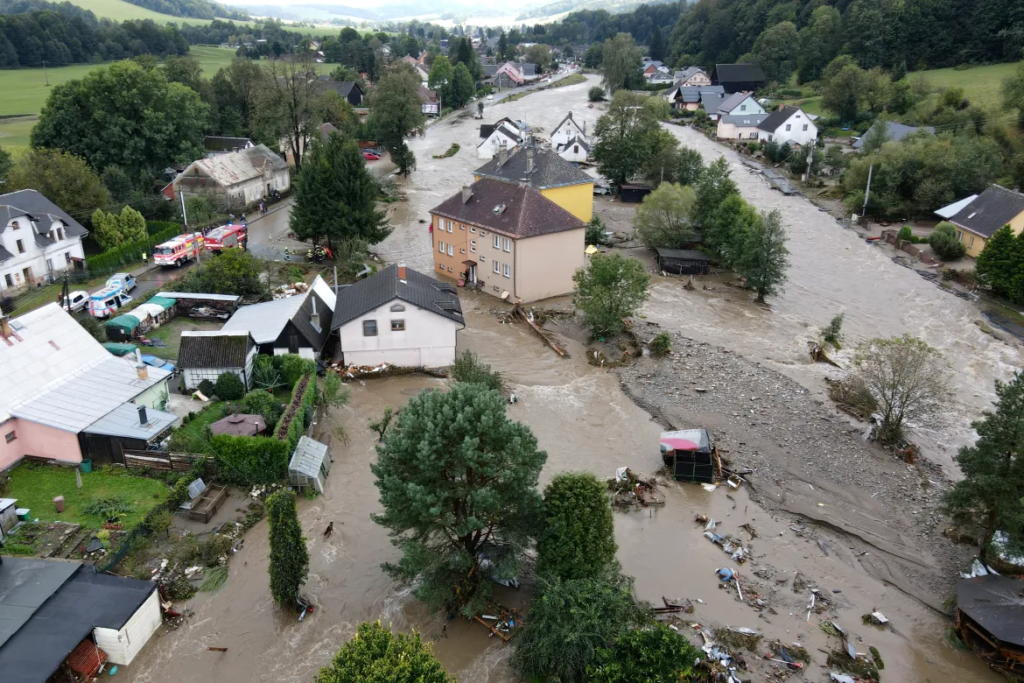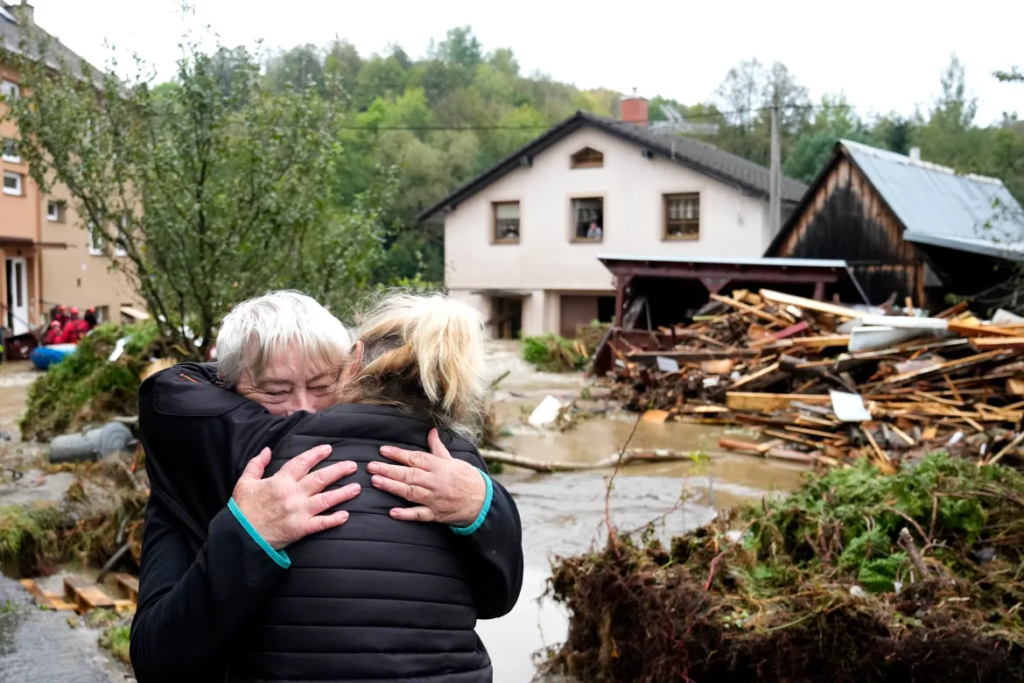Storm Boris has unleashed unprecedented devastation across Central and Eastern Europe, causing extensive flooding, widespread power outages, and tragically claiming at least eight lives.
This powerful storm, characterized by high winds and relentless rainfall, has been pounding the region for days, leaving towns submerged and infrastructure severely damaged.
As the storm continues its onslaught, Romania has borne the worst of its fury, with floods sweeping through villages, homes destroyed, and lives lost. This article delves into the impact of Storm Boris across various countries, the recovery efforts underway, and the looming threat it still poses to Europe.
The Wrath of Storm Boris: A Continental Crisis
Central and Eastern Europe have been battered by Storm Boris since it made landfall earlier in the week. Originating from a low-pressure system, the storm has caused unrelenting rain to pound countries like Austria, Poland, Romania, Hungary, and the Czech Republic.
What initially seemed like a typical seasonal storm quickly transformed into a catastrophe as rivers swelled beyond their banks and surged through towns and cities, destroying homes, sweeping away infrastructure, and leaving citizens scrambling for safety.
The heavy rainfall has been particularly dangerous, as it has caused rivers like the Vltava in the Czech Republic and the Danube in Hungary to reach dangerous levels. These rivers, already vulnerable from seasonal flooding, have burst their banks, flooding low-lying areas and turning roads into rivers.
Storm Boris has also brought with it powerful winds that have downed trees, disrupted transport, and made rescue efforts even more difficult. The relentless combination of wind and water has turned this storm into one of the worst Europe has faced in recent memory.
In Romania, the situation has been particularly dire. Four people were killed in severe flooding on Saturday, and two more have since been reported dead as the country struggles to cope with the devastation. Entire villages have been evacuated, and thousands of homes remain without power.
Read : Romania: Land of Legends and Natural Wonders
The Romanian government has declared a state of emergency in the worst-hit regions, and aid workers are struggling to reach isolated communities cut off by the floodwaters.
The Impact of Storm Boris on Romania

Romania has endured the most devastating impact from Storm Boris, with floods reaching levels not seen in decades. The torrential rain has transformed normally tranquil rivers into raging torrents, flooding entire villages and cutting off access to remote areas.
The death toll in Romania has risen to at least eight, with four lives lost on Saturday alone. Thousands of people have been displaced as homes and infrastructure have been destroyed.
The Romanian government has been working tirelessly to manage the crisis. Emergency services have been deployed to assist with evacuations, and temporary shelters have been established for those who have lost their homes.
Despite these efforts, the sheer scale of the flooding has made rescue and recovery operations incredibly challenging. Roads have been washed away, and bridges have collapsed, making it difficult for rescue teams to reach the most isolated areas.
Among the worst-hit areas is the town of Tecuci, where the Barlad River broke through its banks, flooding the streets and forcing the evacuation of hundreds of residents.
Local authorities have described the scene as a disaster zone, with homes completely submerged and families clinging to rooftops as they wait for rescue. In other parts of Romania, rescue teams have been using boats to navigate flooded streets, providing food, water, and medical supplies to stranded residents.
The government has called for international aid to assist in the recovery efforts. Romania’s President Klaus Iohannis has urged the European Union and neighboring countries to provide assistance, including financial support and resources for rebuilding. In response, several EU member states have pledged to send aid workers and emergency supplies to help Romania cope with the disaster.
Flooding in Poland and the Czech Republic: A Region on Edge

While Romania has been hit the hardest, neighboring countries like Poland and the Czech Republic have also suffered the wrath of Storm Boris. In Poland, one person drowned on Sunday as floodwaters surged through the southwestern part of the country. The storm has caused extensive damage to infrastructure, with roads and bridges collapsing under the force of the water.
One of the most dramatic incidents occurred in the historic Polish town of Glucholazy, near the Czech border, where a bridge collapsed into the raging river below. Local officials quickly ordered the evacuation of nearby residents to prevent further casualties. Another bridge collapsed in the mountain town of Stronie Slaskie, where a dam burst, unleashing a torrent of water that flooded the surrounding area.
The Polish government has declared a state of disaster in the affected areas, with Prime Minister Donald Tusk announcing that the government would seek European Union aid to help with recovery efforts.
Rescue teams are working around the clock to evacuate residents and provide assistance to those who have been stranded by the floods. However, the scale of the disaster has made it difficult to reach some of the more remote areas, where roads have been washed away and communication lines are down.
In the neighboring Czech Republic, the situation is equally dire. Thousands of people have been evacuated from their homes as rivers burst their banks and flooded entire towns.
The Czech government has declared parts of the country disaster zones, and police are still searching for three people who went missing after their car was swept into the river Staric near Lipova-lazne, a village about 235 kilometers (146 miles) east of Prague.
Rainfall in the area has been unprecedented, with some regions receiving as much as 500 millimeters (19.7 inches) of rain since Wednesday. The heavy rain has turned rivers into dangerous torrents, sweeping away bridges and flooding entire towns. In response, the Czech government has deployed military personnel to assist with rescue operations and has called on neighboring countries for assistance.
Austria and Hungary: On High Alert
In Austria, the impact of Storm Boris has been less severe but still dangerous. A firefighter was killed while taking part in rescue efforts, and authorities have declared Lower Austria a disaster zone.
The province surrounding Vienna has been hit hard by flooding, with rivers overflowing and homes submerged. The Austrian government has issued warnings against non-essential travel and has urged residents to remain indoors until the storm passes.
In Hungary, the situation is becoming increasingly precarious. Officials in the capital, Budapest, have raised forecasts for the river Danube to rise to more than 8.5 meters (27.9 feet) later this week, approaching the record height of 8.91 meters (29.2 feet) set in 2013. The rising water levels have prompted warnings for residents living along the river to prepare for potential flooding.
While the rain has eased in some areas, the threat from Storm Boris is far from over. More rain and strong winds are forecast to continue until at least Monday, and authorities in both Austria and Hungary are bracing for the worst.
Cleanup efforts have already begun in some areas, but the sheer scale of the disaster means that recovery will be a long and difficult process.
As Storm Boris continues to ravage Central and Eastern Europe, the full scale of the disaster is becoming apparent. At least eight people have lost their lives, thousands have been displaced, and entire communities have been devastated by the floods. The storm has caused widespread damage to infrastructure, with roads, bridges, and homes destroyed by the relentless rain and wind.
Recovery efforts are already underway in some areas, but the threat from Storm Boris is far from over. More rain and strong winds are forecast for the coming days, and authorities across the region are preparing for further flooding.
International aid will be crucial in helping these countries recover from the disaster, and the European Union is expected to play a key role in providing financial support and resources.
The tragedy of Storm Boris serves as a stark reminder of the power of nature and the importance of being prepared for extreme weather events. As climate change continues to increase the frequency and intensity of storms like Boris, countries across Europe must work together to strengthen their infrastructure and improve their resilience to future disasters.

